Research Area
BT (Biotechnology)
1. Frontier Interfaces Group Laboratory
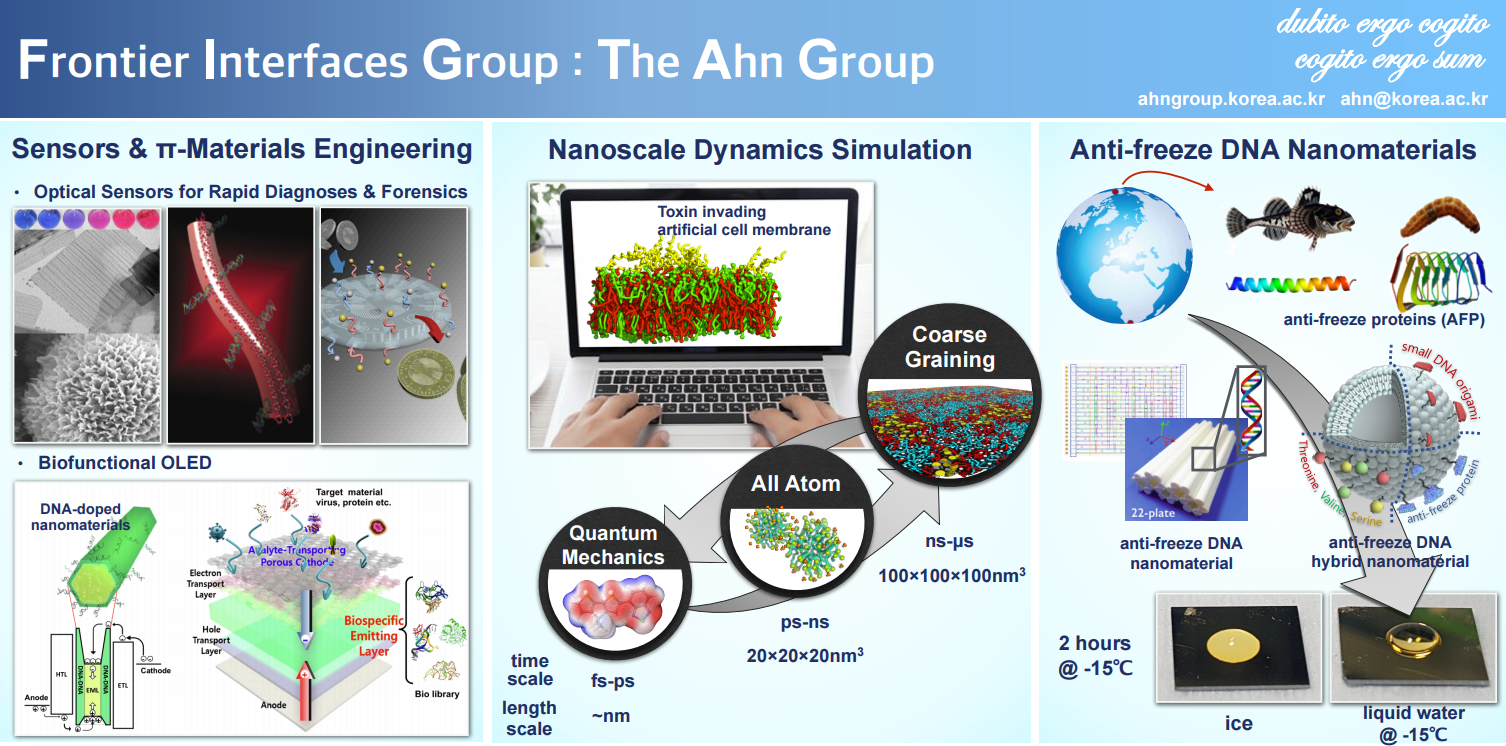
Research interests of Ahn Group include nano-to-macro scale molecular and supramolecular assemblies, surface engineering, and nanobiotechnology.
Toward fundamental knowledge, we investigate molecular-level interaction of chemical and biological materials. Both nanoscale experiments and dynamic simulations are valuable tools of our investigation. The role of interfacial water molecules in chemo-bio interactions is one of the key issues in our laboratory.
In applied regime, we develop rapid on-site detection devices for chemicals of environmental and safety issues, and ultra-sensitive label-free diagnostic sensors for DNAs, proteins, and cells. Our devotion aims at creation of essential technologies for the construction of internet-of-sensors. A recent example is to enable OLED materials to function biological recognition, for the first time.
Our group’s scientific contributions have been published in high-profile journals including Science, J. Am. Chem. Soc., Adv. Mater., Acc. Chem. Res., Nat. Commun., and others, as well as in international intellectual properties.
Our Research area is as follows:
- Interfacial Engineering
- Self- & Kinetic-Assembled Architectures
- Optoelectronic Conjugated Supramolecules for Nanosensing
- Biorecognitive OLED Materials
- Inkjet-Printing Technology for Single-Object Assay
- Engineering for Translational Nanomedicine
- Antifreeze DNA-Based Nanostructures
- Nanoscale Dynamics Simulations
Homepage : http://ahngroup.korea.ac.kr
- For more information, contact : Prof. Dong June Ahn
- Tel : 82-2-3290-3301
- Email : ahn@korea.ac.kr
2. Nanobiocatalysis Laboratory
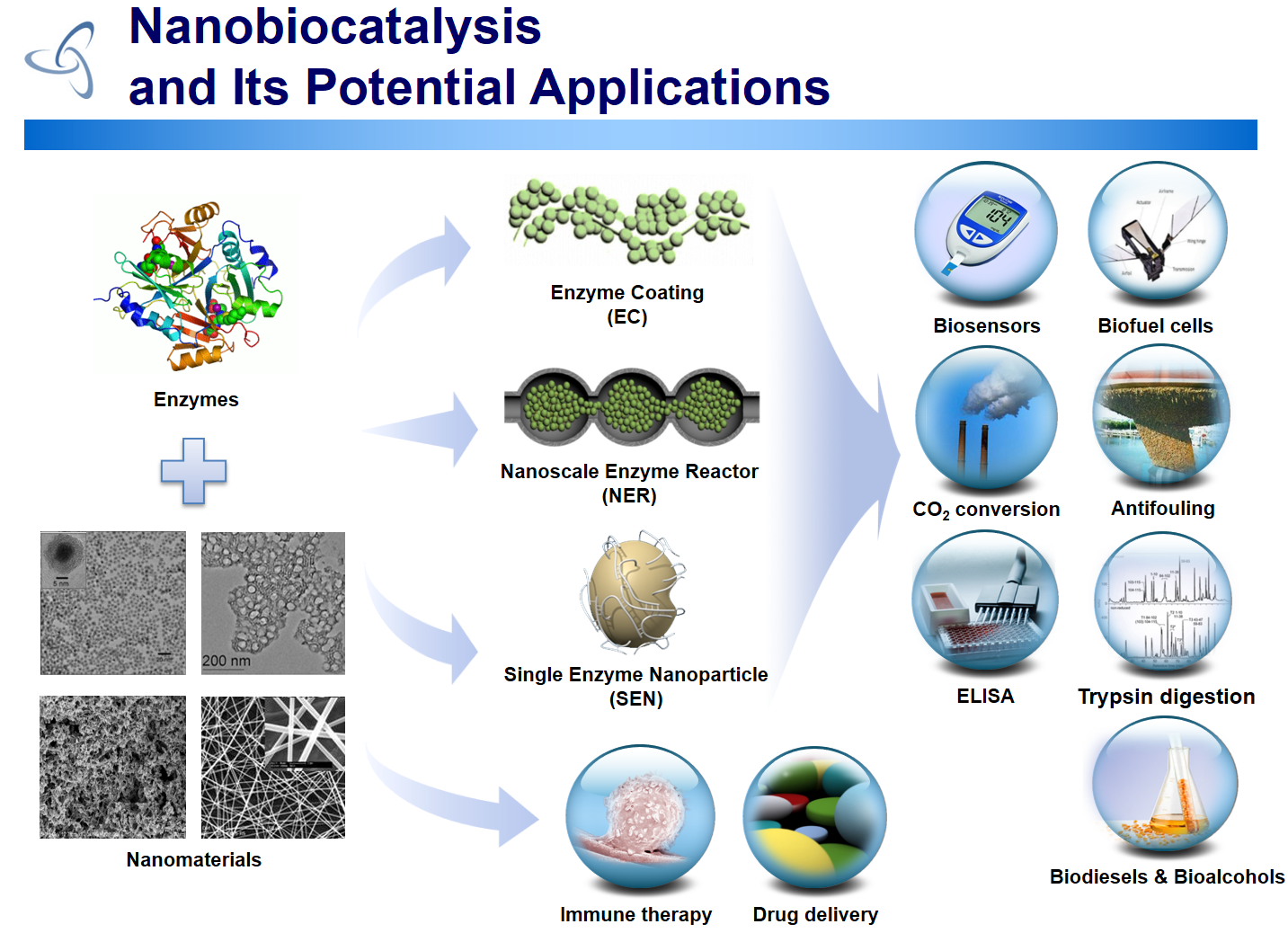
Nanobiocatalysis Laboratory is demonstrating unprecedented successes in stabilizing enzyme activities via original approaches of enzyme coatings (ECs), nanoscale enzyme reactors (NERs) and single enzyme nanoparticles (SENs). These approaches are developed based on the introduction of nanomaterials, and corresponding chemical conjugation strategies, for the immobilization of enzymes. Our studies have revealed that once enzymes are immobilized and stabilized in the form of nanobiocatalysis, they exhibit long lifetime under harsh storage conditions and can be easily reused for multiple times. Based on its stability and reusability, we are demonstrating successful applications of nanobiocatalysis in various fields including biofuel cells, biosensors, trypsin digestions, ELISA, antifouling and CO2 conversion.
Homepage : http://nbc.korea.ac.kr
- For more information, contact : Prof. Jungbae Kim
- Tel : 82-2-3290-4850
- Email : jbkim3@korea.ac.kr
3. Biomolecular Engineering Laboratory

The Biomolecular Engineering Laboratory, founded by professor Jeewon Lee, has focused on biomolecular process engineering such as LFA-based diagnostics, In vivo imaging, Photothermal therapy of cancer, and Synthetic pro-peptide design. We reported a variety of nanoparticle proteins such as cancer targeting peptides, specific disease detection particles, fusion peptides for enhancement of protein secretion in eukaryotes, and nano-vaccines for multiple precaution through one injection.
In addition, we constructed new platforms of the nanoparticle which have characteristics, non-toxicity in vivo, intensive structure, and reasonable price. Currently, we also studies on immunotherapy, nano-enzyme for high value material production, and gene silencing cancer therapy. Finally, these protein nano particles are developed for application in pharmaceutical and biochemical industries.
Homepage : http://bmel.korea.ac.kr
- For more information, contact : Prof. Jeewon Lee
- Tel : 82-2-3290-3304
- Email : leejw@korea.ac.kr
4. Systems Bioengineering Laboratory
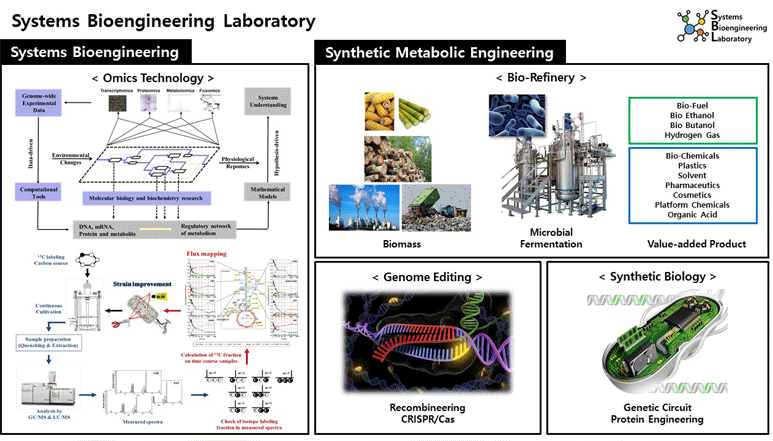
Our laboratory has interests in the metabolic engineering for production of fuels and chemicals from biomass. In order to construct the desirable microbial strains that can produce industrially valuable products in cost effective way, our laboratory is equipped with experimental tools for engineering living organisms. First, we are developing gene cloning, deletion, and genome editing tools and are applying those techniques for achieving maximal effectiveness in the microbial system. Second, we are trying to develop synthetic biology tools, providing novel biological components or modules to build artificial genetic circuits inside the strain. Also, we are equipped with metabolomics and fluxomics, systems biology approaches to understand the chemical reactions in the living organisms. In our lab, we are trying to design and engineer living microorganism for industrial purpose with the synthetic and systems biology approaches.
Homepage : http://faculty.korea.ac.kr/kufaculty/sysbio/index.do
- For more information, contact : Prof. Min-Kyu Oh
- Tel : 82-2-3290-3308
- Email : mkoh@korea.ac.kr
5. Nanobiotechnology Laboratory
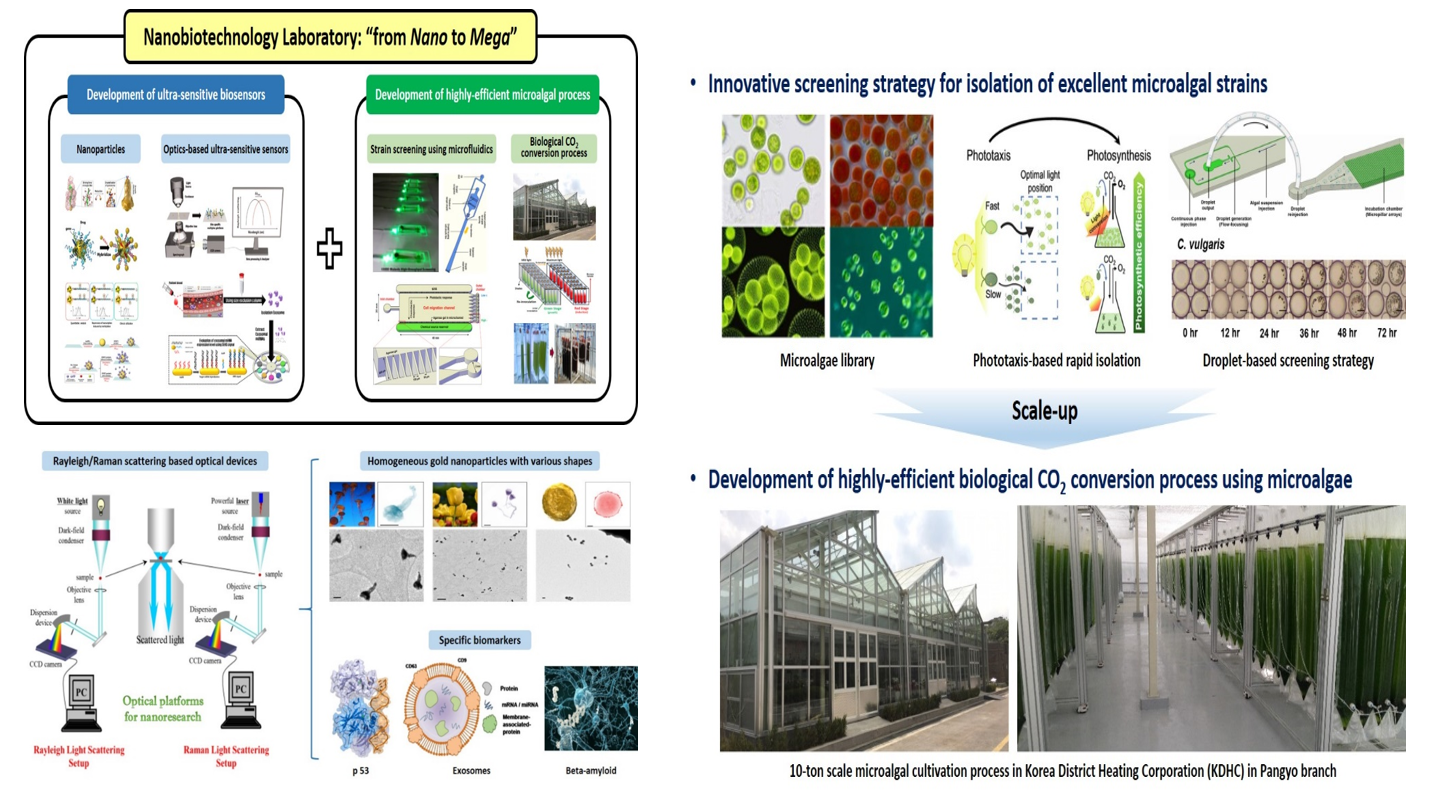
The Nanobiotechnology Laboratory, founded by Professor Sang Jun Sim, is conducting research on various nano-biotechnology techniques focused on early diagnosis and environmental issues.
The research team is currently promoting various projects, which can be applied to various disease models, including cancers and Alzheimer’s disease. Such projects include utilizing inorganic substances such as gold nanoparticles and polyacetylene to actualize molecular imaging technology; developing a next generation nano-biosensor system, which can be commercialized; developing LSPR and Raman darkfield microscope with a supersensitive detection technology along with surface reforming technology; applying various receptor technologies; and enhancing imagery using an amplifier.
Also, our research interest includes the reduction of CO2 in the atmosphere using microalgae for preventing global warming. We are developing poly(dimethylsiloxane) (PDMS)-based integrated microfluidic platforms to perform high-throughput screening of the excellent mutants and multiple steps in sample preparation on a single device for efficient and quantitative analysis of lipid from various microalgal strains. We are also constructing CO2 reduction biological process using microalgae with highly efficient photobioreactors. These approaches will provide novel and efficient solutions for the improvement of photosynthetic productivity of microalgae, which is essential for commercialization of biological conversion of CO2 into microalgal biomass and products.
Homepage: http://nanobiotec.korea.ac.kr
- For more information, contact: Prof. Sang Jun Sim
- Tel: 82-2-3290-4853
- Email: simsj@korea.ac.kr
6. Molecular Modeling and Simulation Lab
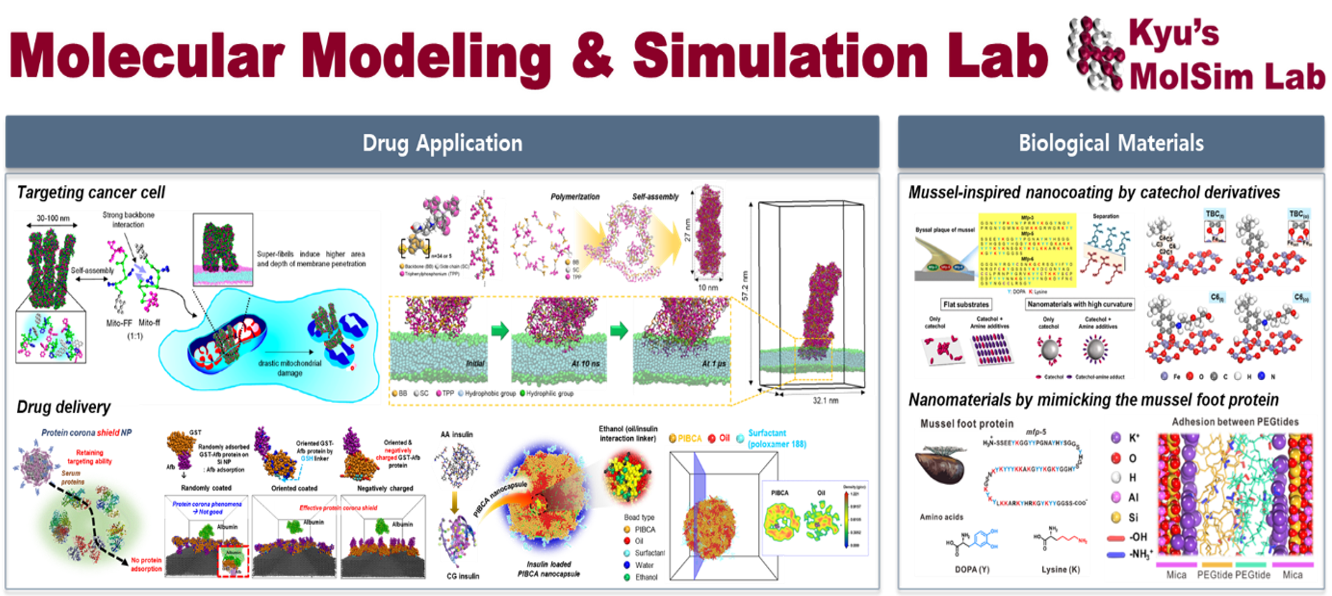
Molecular Modeling and Simulation group under Professor Sang Kyu Kwak is focused on theoretical research about physico-chemical phenomena and diverse properties towards the rational design of novel materials for the biological application through advanced multiscale molecular simulation methods. Our research field covers biological drugs and biological materials. Representative works are about targeting the mitochondria membrane of cancer cells with self-assembly structures for the cancer therapeutics, and drug delivery system using nanoparticles such as protein corona shield and insulin encapsulation. In biological materials, nanostructures mimic the sequence of the amino acid in the organisms (e.g., mussels).
Our Research areas include the followings;
- Targeting cancer cell (Self-assembly structures)
- Drug delivery (Nanoparticle, Encapsulation)
- Biological materials
Homepage : http://kmsl.korea.ac.kr/
- For more information, contact : Prof. Sang Kyu Kwak
- Tel : 82-2-3290-3292
- Email : skkwak@korea.ac.kr
7. Synthetic Biology & Enzyme Engineering Laboratory
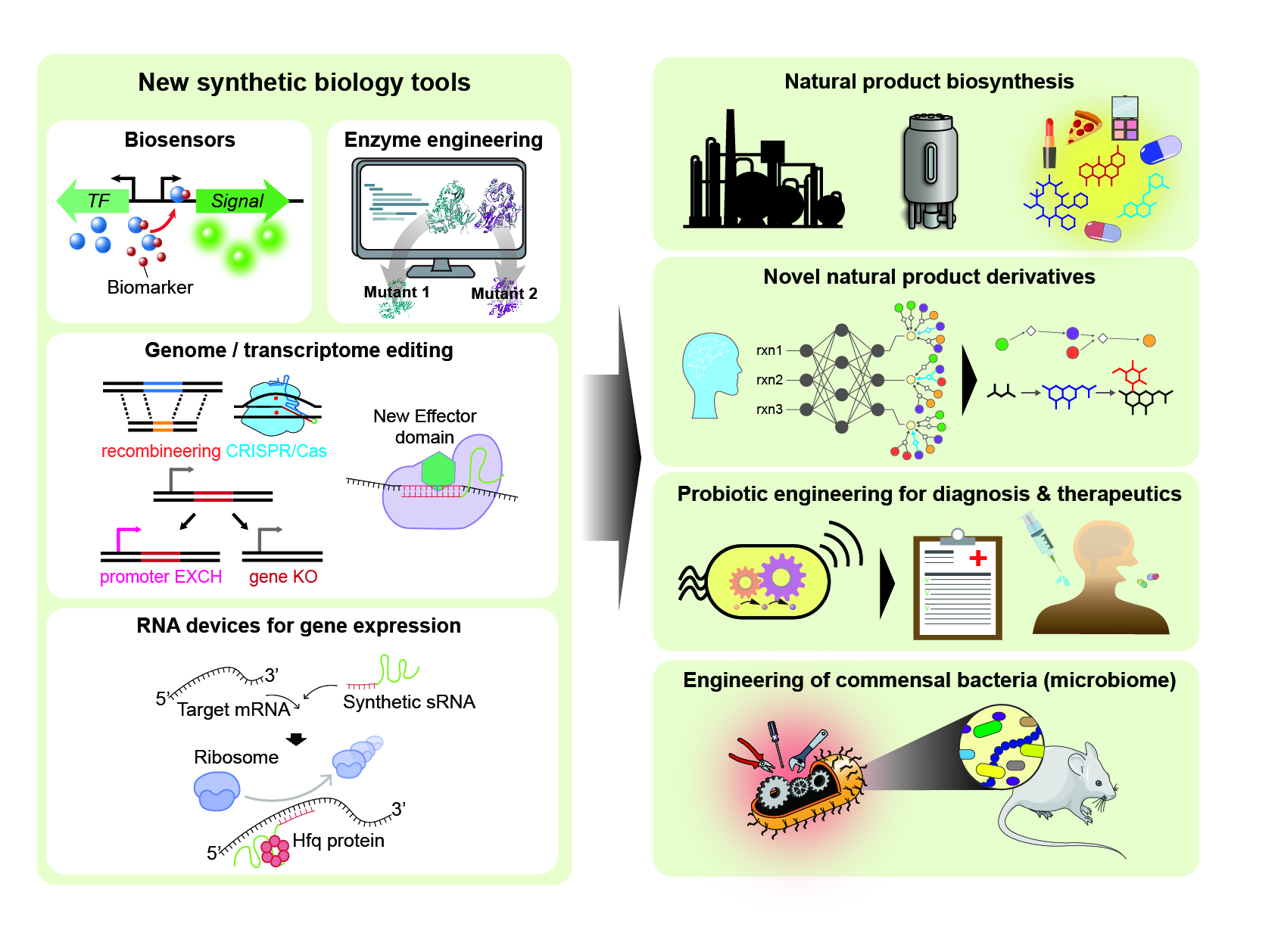
SynBEE Lab (Synthetic Biology & Enzyme Engineering Laboratory) aims to develop synthetic biology tools and enzyme engineering strategies to reprogram microorganisms for both industrial and biomedical applications. For industrial applications, we aim to create new enzymes by directed evolution or computer-assisted mutagenesis. Such enzymes can be used to produce novel medicinal natural products (e.g., antibiotics, anticancer agents, and antifungal agents) with enhanced effects. We are also aiming to develop new synthetic biology tools including genome/transcriptome editing tools or metabolite biosensors that will boost the efficiency of genetic engineering. For biomedical applications, we are aiming to develop microbiome engineering strategies for mitigating the virulence of bacterial pathogens. We also aim to construct probiotic bacteria for diagnostic or therapeutic purposes.
Our Research areas include the followings;
- Molecular biosensors
- Genome/transcriptome editing
- RNA devices for gene expression regulation
- Directed evolution of enzymes
- Natural product chemistry
- Polyketide biosynthesis
- Microbiome engineering
- Development of probiotic strains for diagnosis and/or therapeutics
Homepage : http://yanglaboratory.com/
- For more information, contact : Prof. Dongsoo Yang
- Tel : 82-2-3290-4855
- Email : dosoyang@korea.ac.kr
ET (Energy and Environmental Technology)
1. Inorganic Materials for Separation and Reaction Laboratory
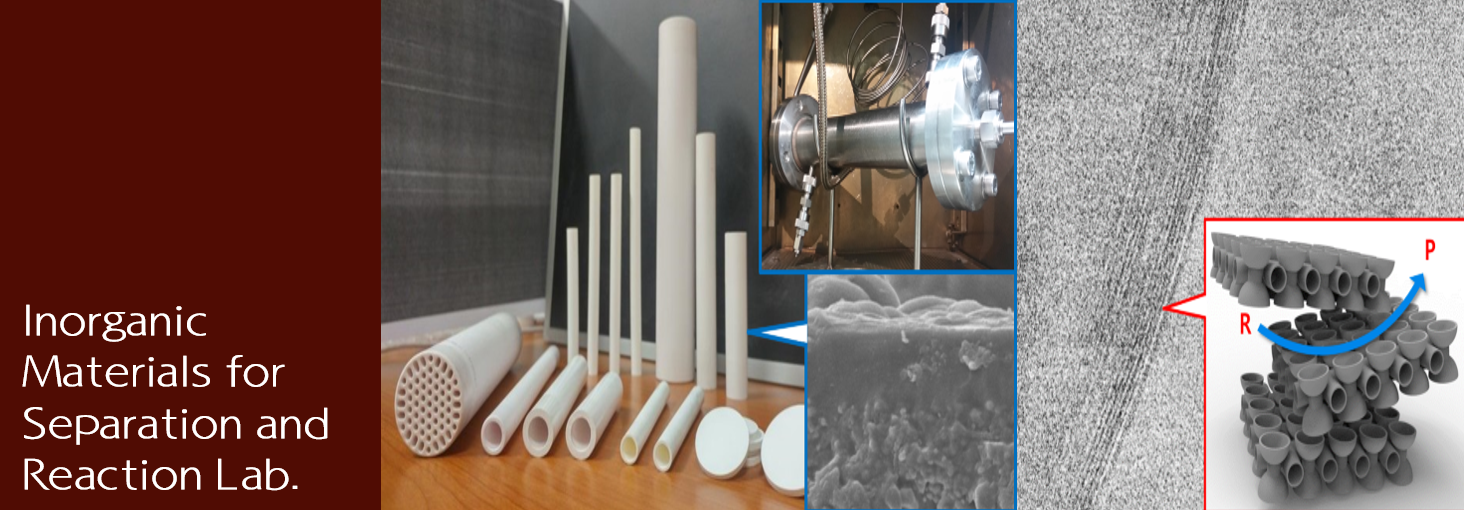
Inorganic Materials for Separation and Reaction (IMSR) group is carrying out researches about membranes and catalysts. Our overarching goal is to make defect-free and highly selective membranes with good reproducibility and to synthesize highly selective catalysts with great conversion and stability. Our current researches focus on understanding the working mechanisms induced by the structure of materials and achieving desired performances of membranes, adsorbents, and catalysts.
Researches on inorganic membrane;
- Elucidation of crystal growth
- Organic & inorganic complex membranes
- Fabrication of oriented membranes
- Scale up of membranes for industrial-level gas and/or liquid separation process
Researches on inorganic adsorbents and catalysts;
- Highly stable adsorbents with large capacity
- Control of reaction rates in hierarchically structured catalyst
- Modification of catalyst’s chemical and physical characteristics for improving catalytic performance
- Mass production of catalysts for industrial application
Homepage : http://imsr.korea.ac.kr
- For more information, contact : Prof. Jungkyu Choi
- Tel : 82-2-3290-4854
- Email : jungkyu_choi@korea.ac.kr
2. Nano Energy Convergence System Laboratory
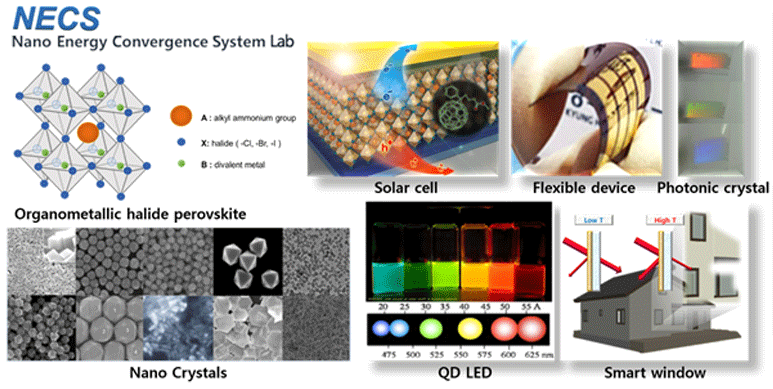
The research activity of our group is focused on the structure and morphology design of nano-energy materials for the application to the future energy convergence systems. Especially, we have been developing the multiscale nano-building blocks including polymers, ceramics, metals, and semi-conductors to efficiently manipulate the various types of energy because such nanomaterials can exhibit prominent electronic, optical, and catalytic properties. Currently we are studying next generation solar energy conversion and storage systems.
Research Area :
- Next-generation solar cells : Perovskite solar cells, QD solar cells, Inorganic solar cells
- Optoelectronic devices : Perovskite LEDs, Photodetectors
- Nano energy convergence system : Thermoelectric, Piezoelectric, Triboelectric
- Synthesis of advanced functional nanomaterials
- Design and synthesis of nano energy materials
- Colloidal photonic crystals
Homepage : http://necs.korea.ac.kr/
- For more information, contact : Prof. Sang Hyuk Im
- Tel : 82-2-3290-3295
- Email : imromy@korea.ac.kr
3. Molecular Design Laboratory

Dr Kang’s primary research area is on the molecular thermodynamics and molecular modeling. He joined the project for developing KDB (Korea thermophysical properties Data Bank) from 1995 to 1997 and he is also responsible for later maintenance and further development of KDB. From 2007, he became general manager of Data Center for Thermophysical Properties which is supported by Korean Government. Based on thermodynamics and physical properties database, MDL(Molecular Design Laboratory) extends research fields in various industrial applications.
- Crystallization Processes
- Liquid Organic Hydrogen Carrier (LOHC)
- Properties of CO2 for CCS Processes
- Collaboration with industry in the field of thermodynamics and its applications
Homepage : http://cbemdl.com/
- For more information, contact : Prof. Jeong Won Kang
- Tel : 82-2-3290-3305
- Email : jwkang@korea.ac.kr
4. Molecular Modeling and Simulation Lab
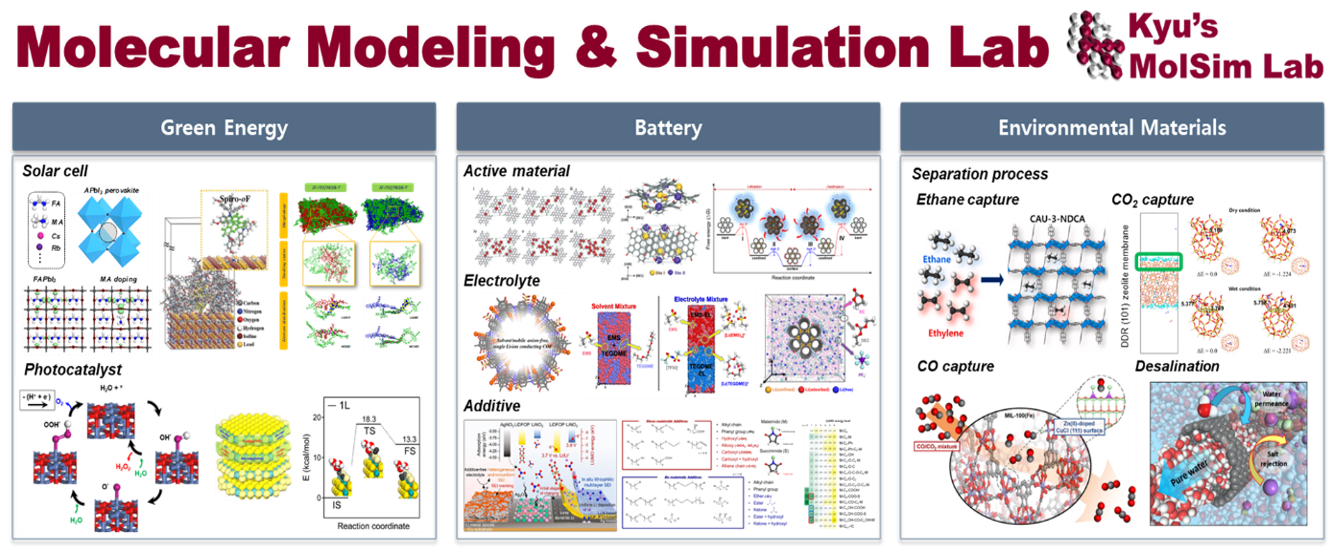
Molecular Modeling and Simulation group under Professor Sang Kyu Kwak is focused on theoretical researches about physico-chemical phenomena and diverse properties towards rational design of novel materials to solve global issues related to energy and environmental field through advanced multiscale molecular simulation method. Our research field covers green energy, battery, and environmental materials. Representative works on green energy are about high-efficiency solar cell and high-performance photocatalyst. Our works related to battery materials include the development of their components to design high energy density and high stability battery cells. Our research on environmental materials emphasizes on functional materials with high selectivity and sensitivity for processes such as gas separation and desalination.
Research Area :
- Solar cell (Perovskite, Organic materials)
- Photocatalyst (ORR, OER, HER)
- Battery materials (Active materials, Electrolytes, Additive, Cathode, Anode)
- Phase equilibria, gas separation, desalination
- Chemical, physical reactions
Homepage : http://kmsl.korea.ac.kr/
- For more information, contact : Prof. Sang Kyu Kwak
- Tel : 82-2-3290-3292
- Email : skkwak@korea.ac.kr
5. Sustainable & Environmental Materials Lab
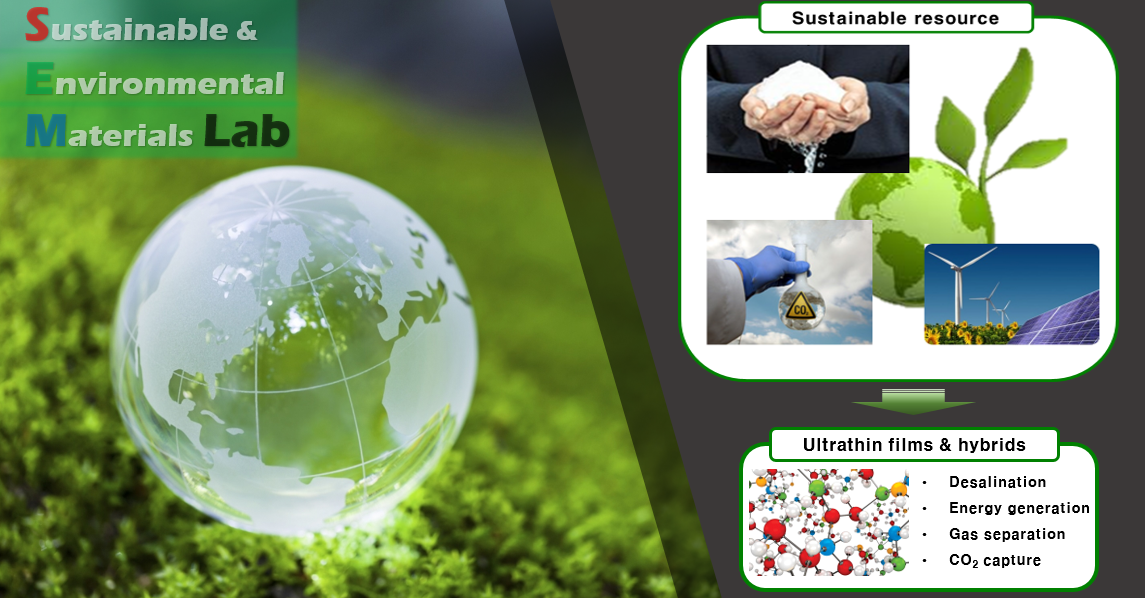
The research of our lab is focused on developing advanced organic or hybrid materials for securing clean water and environment and saving energy in a sustainable manner. In particular, we are devising novel nanoscale architecturing methods and employing them to create thin films and membrane materials with high performance, excellent durability and unique functions along with elucidating the underlying fundamentals of material structure-property-performance relationship. Our research topics include the fabrication of membranes for water purification, desalination, biochemical separation and gas separation, design of antifouling and self-cleaning surfaces and characterization of nanoscale and interfacial properties.
Homepage : http://omsl.korea.ac.kr
- For more information, contact : Prof. Jung-Hyun Lee
- Tel : 82-2-3290-3293
- Email : leejhyyy@korea.ac.kr
6. Energy Materials and Processes Laboratory

The Energy Materials and Processes Laboratory (EMPL), founded by Professor Ki Bong Lee in 2009, has worked on separation technologies such as adsorption, membrane separation, solvent extraction, etc. for the application to energy and environmental fields. Particularly, EMPL has interest in novel separation-enhanced reaction processes where separation and reaction can be carried out simultaneously in a single unit, resulting in overcoming of thermodynamic limitation and the development of compact and economical processes.
EMPL has focused on three topics: hydrogen production, greenhouse gas mitigation, and heavy oil upgrading. In the hydrogen research, sorption-enhanced reaction processes, where hydrogen production reaction and by-product CO2 removal by sorption are performed simultaneously, have been developed. For greenhouse gas mitigation, high-temperature CO2 sorbents such as hydrotalcite, double salt, and sodium zirconate are newly developed. Also, new porous carbon materials are developed from various precursors for adsorption of CO2 and non-CO2 gases like CF4. Heavy oil upgrading studies are targeting efficient utilization of oil sand bitumen and vacuum residues. Among many upgrading processes, solvent deasphalting and fast pyrolysis processes are studied. Recently, studies on adsorption of NOx, sulfur compounds, and Cu ions have started.
Homepage : https://www.kuempl.com
- For more information, contact : Prof. Ki Bong Lee
- Tel : 82-2-3290-4851
- Email : kibonglee@korea.ac.kr
7. Reaction Engineering and Microsystem laboratory

The reaction engineering & microsystem laboratory is founded by professor Kwang Ho Song. Micro-reaction technology is main research topic in microsystem laboratory. In particular, studies are being conducted on the design of an optimal micro-reactor and micro-mixer for various reactions. Micro-reactor has tremendous benefits comparing with common type Batch reactor and is a promising concept in the future.
- Microreaction Technology & Microreactor Design
- Continuous Flow Microreactor Technology
- Gas-Liquid Dispersion using Micromixer
- Micromixer-polymer particles
- Microreactor – Transparent Polymers
- Process Intensification
- Fuel Cells
Homepage : http://microche.korea.ac.kr
- For more information, contact : Prof. Kwang Ho Song
- Tel : 82-2-3290-3307
- Email : khsong@korea.ac.kr
8. Electrochemical Energy Laboratory

The Electrochemical Energy Laboratory, under the supervision of Professor Seung-Ho Yu, focuses on designing and developing new materials at the nanoscale level to be applied to electrochemical devices. These include but are not restrained to electrodes in secondary batteries (lithium-ion, lithium-metal, lithium-sulfur, and sodium-ion batteries) and electrocatalysts for the oxygen reduction reaction in fuel cells. We are also interested in mechanistic studies of rechargeable battery electrodes using operando synchrotron X-ray based methods (such as X-ray phase contrast imaging, X-ray absorption spectroscopy and X-ray diffraction and so on), and in-situ/cryogenic electron microscopy.
Homepage : http://yu.korea.ac.kr
- For more information, contact : Prof. Seung-Ho Yu
- Tel : 82-2-3290-3297
- Email : seunghoyu@korea.ac.kr
9. Advanced Battery & Electrochemical Catalysts Lab
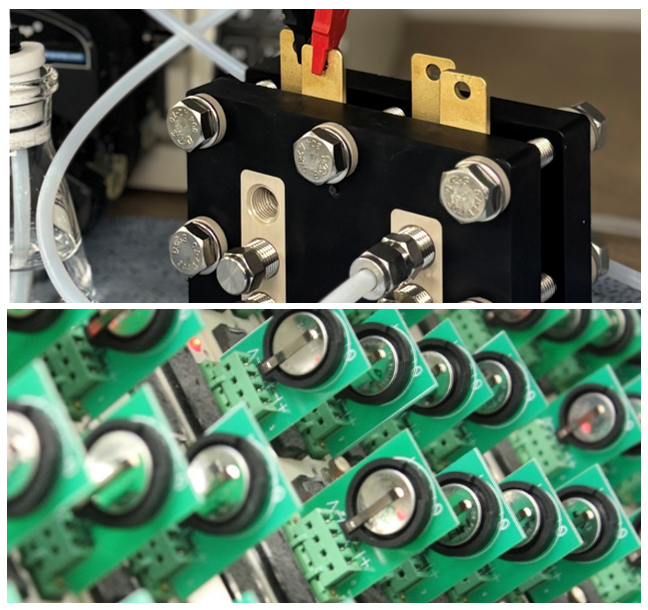
Key Research Areas :
Next-Generation Batteries
- Li–S Batteries: High-energy density batteries with advanced cathode materials.
- Solid-State Batteries: Development of advanced materials for improved ion transport and energy density.
Electrochemical Catalysis for Clean Energy
- Nanostructured Catalysts: Boosting reaction efficiency, selectivity for sustainable energy conversion.
- Electrochemical Transformations: Hydrogen production via water splitting (HER & OER) and CO₂ conversion into valuable fuels.
Graduate Careers :
Our graduates frequently join top research institutes and companies, including:
Korea Institute of Energy Research, Samsung Electronics (Semiconductor R&D), LG Energy Solution (Battery R&D)
Homepage : http://moonlab.korea.ac.kr
Youtube Link: https://youtu.be/ql7DaxFUT9Y
- For more information, contact : Prof. Jun Hyuk Moon
- Tel : 82-2-3290-4859
- Email : junhyukmoon@korea.ac.kr
10. Energy Process Systems Engineering Lab

The goal of research in Prof. Won’s group is to develop theory, models, and solution algorithms for problems in the general area of Process Systems Engineering. Research interests include (1) process synthesis, (2) control, (3) optimization, (4) analyses such as techno-economic evaluation, life cycle assessment, and inter-industry analysis. These studies play a crucial role in addressing climate change and developing renewable energy resources, thereby facilitating the energy transition of our society.
Major research topics:
– All value-chains of H2 industries: production, transportation, and utilization
– Sustainable fuels and chemicals: biomass-based biofuels and chemicals, biodegradable plastic, waste-to-energy
– CO2 capture and utilization: pressure swing adsorption, amine-based absorption, membrane
– AI-based modeling and optimization
– Life cycle assessment for circular economy, carbon neutralization, and GHG reduction
Homepage : https://wwon.korea.ac.kr
- For more information, contact : Prof. Wangyun Won
- Tel : 82-2-3290-4858
- Email : wwon@korea.ac.kr
11. Advanced Catalysis and Reaction Engineering (ACRE) Lab
The Advanced Catalysis and Reaction Engineering (ACRE) Lab, led by Professor Insoo Ro, explores catalytic science and engineering to create sustainable pathways for energy and environmental solutions. Our research covers the full spectrum of catalysis, from fundamental studies of active sites to applied systems for waste valorization and clean energy production. We focus on catalyst design, mechanistic understanding, and process innovation, ensuring that our work contributes to both academic knowledge and industrial technologies.
Representative contributions include atomically dispersed and interfacial catalysts for selective transformations, hydrogen-free strategies for plastic waste upcycling, and bifunctional systems that enable tandem reactions. At the same time, we integrate machine learning with experimental studies to accelerate catalyst discovery and deepen mechanistic insight. By combining these approaches, the ACRE Lab positions itself to tackle any challenge in catalysis research, ranging from molecular design to process-scale innovation.
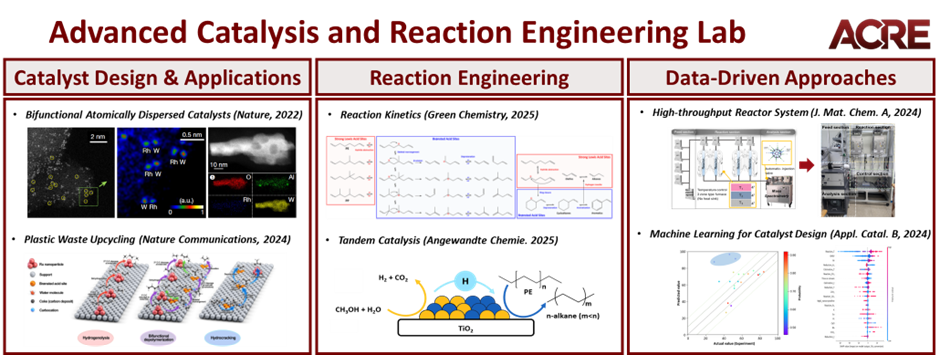
Research Area:
- Catalyst Design & Applications (metal–oxide interfaces, atomically dispersed sites, bifunctional and tandem catalysts, plastic waste upcycling, CO₂ conversion)
- Reaction Engineering & Mechanistic Insights (hydrogen-free strategies, selective hydrogenation, hydroformylation, operando spectroscopy, kinetics, structure–activity relationships)
- Data-Driven and Emerging Approaches (machine learning, quantum neural networks, predictive modeling for catalytic discovery and optimization)
Homepage : (to be updated soon)
- For more information, contact : Prof. Insoo Ro
- Tel : 82-2-3290-3291
- Email : insooro@korea.ac.kr
NT (Nanotechnology)
1. Frontier Interfaces Group Laboratory

Research interests of Ahn Group include nano-to-macro scale molecular and supramolecular assemblies, surface engineering, and nanobiotechnology.
Toward fundamental knowledge, we investigate molecular-level interaction of chemical and biological materials. Both nanoscale experiments and dynamic simulations are valuable tools of our investigation. The role of interfacial water molecules in chemo-bio interactions is one of the key issues in our laboratory.
In applied regime, we develop rapid on-site detection devices for chemicals of environmental and safety issues, and ultra-sensitive label-free diagnostic sensors for DNAs, proteins, and cells. Our devotion aims at creation of essential technologies for the construction of internet-of-sensors. A recent example is to enable OLED materials to function biological recognition, for the first time.
Our group’s scientific contributions have been published in high-profile journals including Science, J. Am. Chem. Soc., Adv. Mater., Acc. Chem. Res., Nat. Commun., and others, as well as in international intellectual properties.
Our Research area is as follows:
- Interfacial Engineering
- Self- & Kinetic-Assembled Architectures
- Optoelectronic Conjugated Supramolecules for Nanosensing
- Biorecognitive OLED Materials
- Inkjet-Printing Technology for Single-Object Assay
- Engineering for Translational Nanomedicine
- Antifreeze DNA-Based Nanostructures
- Nanoscale Dynamics Simulations
Homepage : http://ahngroup.korea.ac.kr
- For more information, contact : Prof. Dong June Ahn
- Tel : 82-2-3290-3301
- Email : ahn@korea.ac.kr
2. Optoelectronics, Photonics & Energy Laboratory

Our group is playing with colloidal quantum dot (CQD) and emerging hybrid semiconductors for various types of device such as optoelectronics (sensing and emission), photonics and energy conversion device. We especially focus on the interaction between light and nano-sized matter and explore their photo-physics via theoretical simulation and experiments. Based on our new findings, we eventually propose the way to apply our new strategies to the upcoming next generation industrial fields such as diagnosis, autonomous driving, virtual reality and IoT (internet of things).
Here are detail fields of research interest as below:
- Synthesis of colloidal quantum dots and characterizations
- Building hybrid platform: CQD with organic/inorganic semiconductors
- Optical sensor & light emitting devices
- Solar energy conversion and low energy collection
- Photonic structures
- Optoelectronics simulations (SCAPS, Lumerical FDTD and etc)
Homepage : http://opel.xehub.net/
- For more information, contact : Prof. Se-Woong Baek
- Tel : 82-2-3290-3302
- Email : sewoongbaek@korea.ac.kr
3. Nano-structured Organic Materials Research Laboratory
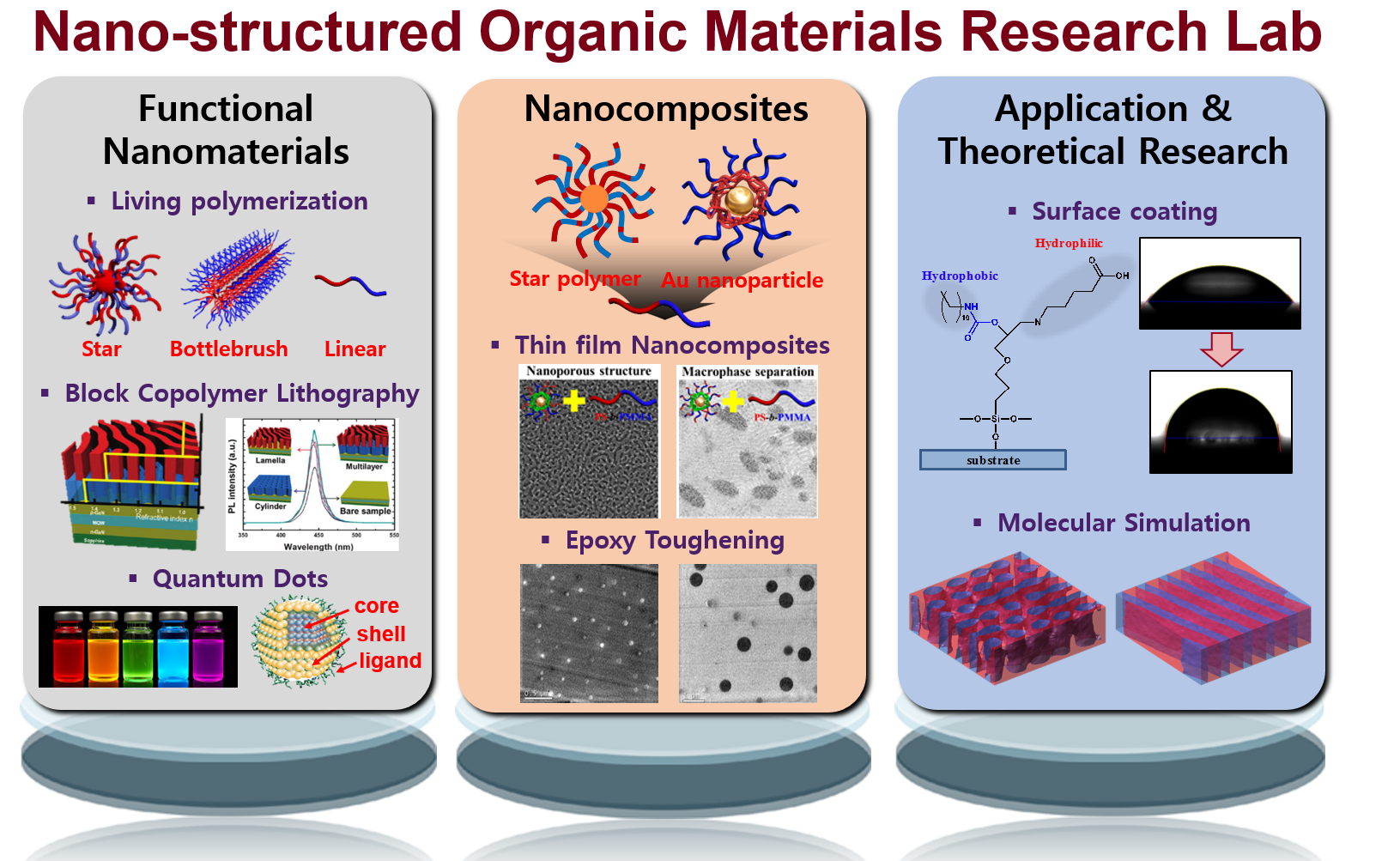
The Nano-structured Organic Materials Research Laboratory, under the supervision of Professor Joona Bang, carries out research on various block copolymers and their applications. We design monomers, polymerize them using various methods of polymerization such as RAFT polymerization, ATRP, anionic polymerization, ROP, and ROMP. These polymers are then processed to be used in various fields including block copolymer nanolithography, organic nanoparticles synthesis, epoxy toughening, quantum dots and anti-fouling materials. In addition to lab work, our lab also performs computational simulations based on field theory and a particle-based model to predict the behavior of macromolecules.
Our Research area is summarized as follows:
- Synthesis of various functionalized monomers
- Living radical polymerization (RAFT polymerization, NMP, ATRP, ROMP, anionic polymerization)
- Synthesis of architecturally diverse polymers (star, bottlebrush, single chain nanoparticles, etc.)
- Directed self-assembly of block copolymers
- Advanced block copolymer nanolithography using non-linear block copoymers
- Block copolymer nanocomposites
- Anti-adhesion surface by monolayer coating
- Photoluminescence quantum dots
Homepage : https://kunom3837.iwinv.net/
- For more information, contact : Prof. Joona Bang
- Tel : 82-2-3290-3309
- Email : joona@korea.ac.kr
4. Nano Materials & Functional Thin Film Laboratory
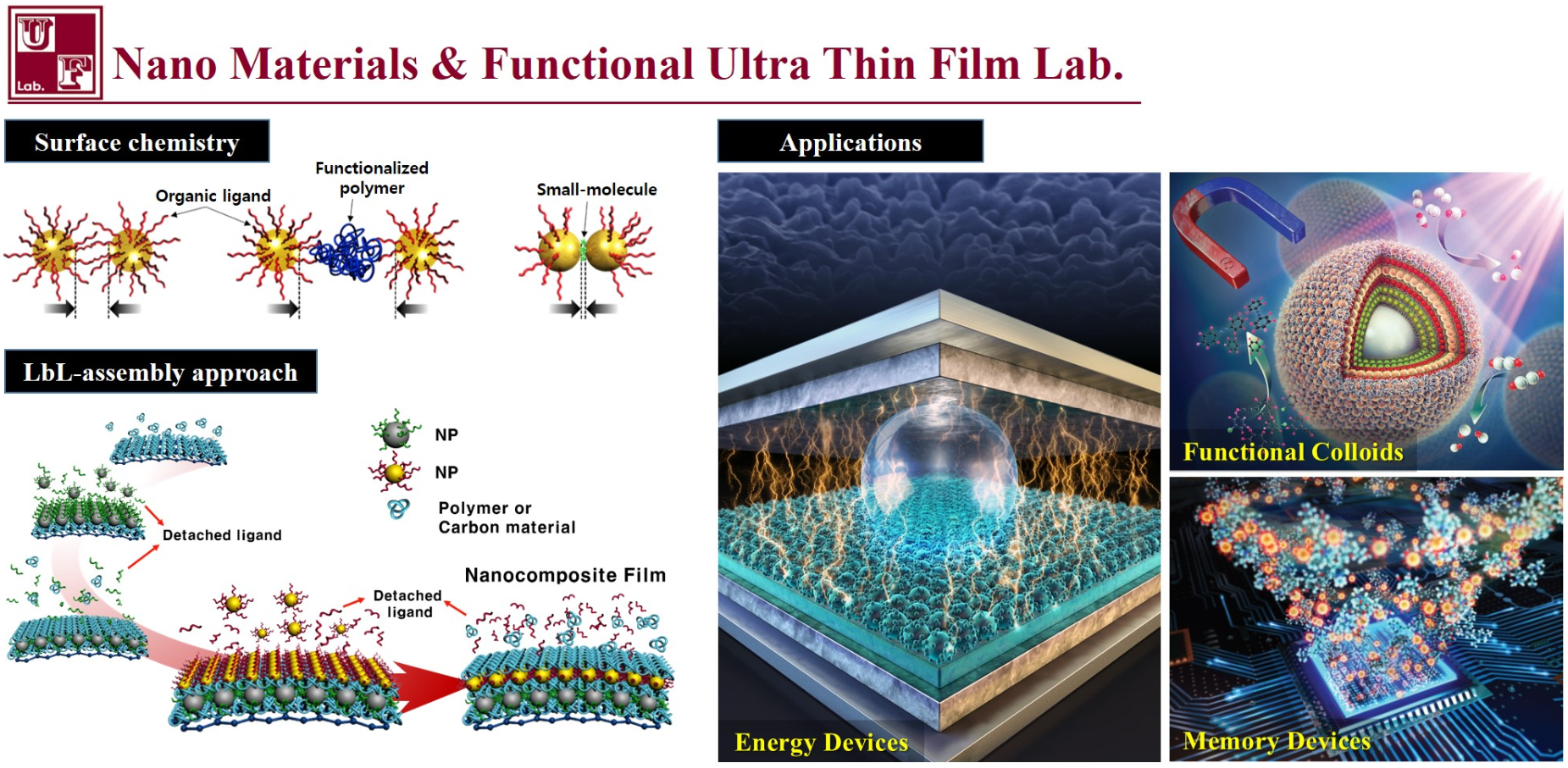
Nano Materials & Functional Thin Film Lab under supervisor of Prof. Jinhan Cho has focused on the development of novel layer-by-layer (LbL) assembly approach as well as the fabrication of LbL-assembled thin film applications using various adsorption mechanism and surface chemistry. For this goal, all the graduate students in our research group are studying (1) the surface chemistry of polymers, (2) the synthesis and surface modification of metal (or metal oxide) nanoparticles and carbon-based materials (carbon nanotube and reduced graphene oxide), (3) the interface control through complementary interactions (electrostatic interaction, hydrogen-bonding, and covalent interactions), and (4) the device physics of thin film-based target applications. Up to date, our group have developed a variety of novel LbL-assembly approaches called as ligand exchange LbL, ligand addition LbL, amphiphilic LbL, small molecule-mediated LbL assembly. Recently, our group have developed the multifunctional colloids, the nonvolatile memory devices, the triboelectric devices, the supercapacitor, and the batteries that can exhibit the higher performance through our novel LbL assemblies.
What is LbL assembly ?
LbL assembly method offers diverse opportunities to prepare organic/organic and/or organic/inorganic nanocomposite films with tailored optical, magnetic, biological and electrical properties. An important advantage of this method is that it enables the preparation of films with controlled thickness, composition and functionality on substrates of different size and shape. Additionally, various inorganic nanoparticles as well as organic components can be inserted within LbL films through complementary interactions (i.e., electrostatic, hydrogen-bonding, or covalent interaction).
Research area of our group is as follows:
- Synthesis of nanomaterials
- Development of Novel LbL-assembly and nanocomposite multilayer films
- Thin film based-functional Colloids
- Nonvolatile memory devices
- Triboelectric devices
- Supercapacitor
- Batteries
Homepage : http://uflab.korea.ac.kr
- For more information, contact : Prof. Jinhan Cho
- Tel : 82-2-3290-4852
- Email : jinhan71@korea.ac.kr
5. Surface Nano Fabrication Laboratory
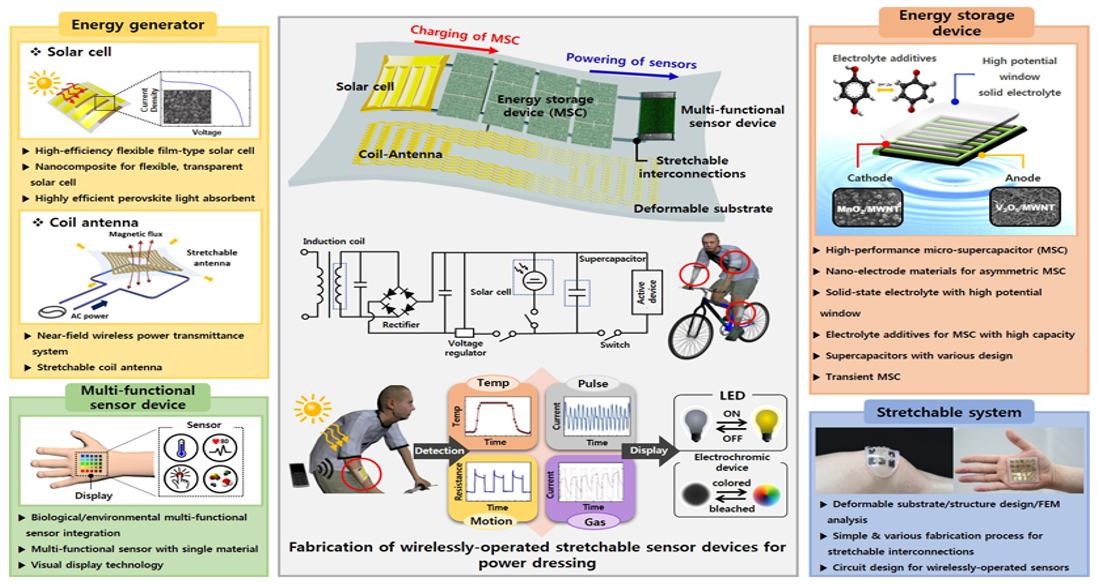
The research aim of Surface Nano Fabrication Laboratory (SNFL) is to establish a practical fabrication technology for wirelessly operated wearable electronics via integration of wireless energy generator, energy storage device, and bio-environmental sensors on a single deformable substrate. For this, we conduct research on (1) developing high-efficiency, flexible solar cell as a wireless energy generating device and a wireless power receiving device using a coil antenna, (2) devising high-performance supercapacitors, (3) fabricating multi-functional sensors with visual display, and (4) integrating all the device elements on a single deformable polymer substrate which is skin-attachable.
Detailed research area is as follows :
- Interfacial Engineering
- Carbon material-based stretchable supercapacitor
- Transient supercapacitor
- Stretchable/wearable multi-functional sensor
- Electrochromic device
- Near-field power transmission device
- Flexible solar cell
- Nanopores
Homepage : http://surfnano.korea.ac.kr
- For more information, contact : Prof. Jeong Sook Ha
- Tel : 82-2-3290-3303
- Email : jeongsha@korea.ac.kr
6. Molecular Modeling and Simulation Lab
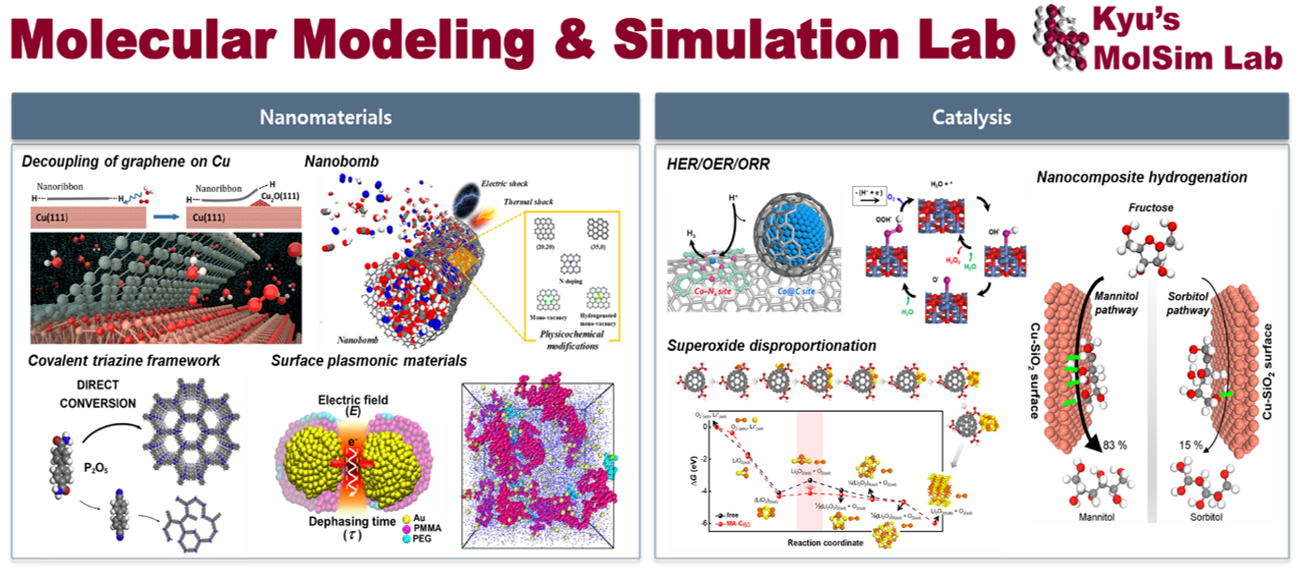
Molecular Modeling and Simulation group under Professor Sang Kyu Kwak is focused on theoretical researches about physico-chemical phenomena and diverse properties towards rational design of novel nanomaterials for various applications through advanced multiscale molecular simulation method. Our research field covers nanomaterials and catalysis. Representative works are about mechanical and thermodynamic properties of carbon-based functional materials (e.g., graphene, nanotube, and covalent framework), nanoparticles, and plasmonic materials for sensor application. Our works also include various catalytic reactions on those nanomaterials such as hydrogen/oxygen evolution reactions, oxygen reduction reaction, hydrogenation, and superoxide disproportionation.
Detailed research area is as follows :
- Multidimensional carbon, carbon neutrality (CCUS)
- Molecular machine
- Nanoparticles (Hard, Soft)
- Catalysts
- Nanocomposite materials
Homepage : http://kmsl.korea.ac.kr/
- For more information, contact : Prof. Sang Kyu Kwak
- Tel : 82-2-3290-3292
- Email : skkwak@korea.ac.kr
IT (Information Technology)
1. Microfluidic Process and Biopolymer Laboratory

The microfluidic process and biopolymer laboratory, founded by Professor Ki Wan Bong, is engaged in research on the synthesis, assembly, and analysis of 3D soft matter architectures. Using microfluidic-assisted fabrication methods and biocompatible materials, we have built complex 3D structures for use with in vitro diagnostics and in vivo therapeutics.
Our research areas include:
- Flow Lithography
- Particle technology for biomedical applications
- Droplet-based microfluidics
- Bio-micro electro mechanical systems (BioMEMs)
- Biopolymers
- Soft lithography and patterning
- Nanoparticle synthesis
Homepage : https://www.bongresearchgroup.kr
- For more information, contact : Prof. Ki Wan Bong
- Tel : 82-2-3290-3294
- Email : bong98@korea.ac.kr
2. Complex Fluids Engineering Laboratory
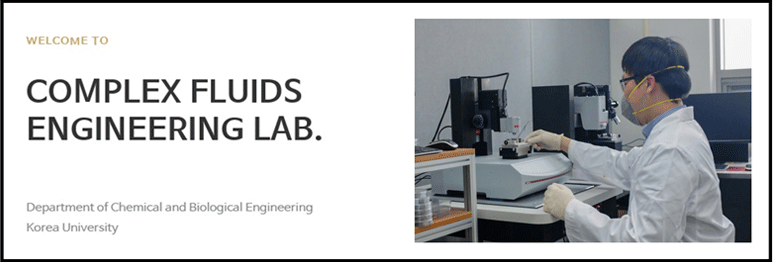
Complex Fluids Engineering Laboratory (CFEL, Prof. Hyun Wook Jung) focuses on rheology and rheological processes based on theoretical modeling, simulation, and experiments. CFEL’s research fields are shown below.
- Nonlinear dynamics/stability/sensitivity in polymer processes
- Fundamental coating and drying processes
- Micro-rheology using Brownian dynamics and light scattering techniques
- Chemorheology and crosslinking characteristics of organic coatings
- Suspension rheology
- Macro-/micro-scale computations of exhaust gas flows inside porous filters
CFEL contributed to the product quality control and productivity enhancement in polymer extensional deformation processes such as film casting and film blowing, exhibiting Hopf bifurcation features. CFEL also established the key strategy for uniform coating flow control and operability windows in pre-metered coating processes which have been importantly applied in IT industries manufacturing display films, Li-ion secondary batteries, and fuel cells. CFEL elucidated the relationship between curing kinetics and mechanical properties of dual-curable organic coatings for automotive applications. Employing various light scattering techniques such as dynamic light scattering (DLS), diffusing wave spectroscopy (DWS), and multi-speckle DWS, CFEL have investigated the micro-rheological aspects in particulate suspension systems. Through Brownian dynamics simulations and related microfluidic experiments, CFEL clarified the migration and conformation of polyelectrolyte/biological polymer chains in various flow fields. CFEL recently performed macro/microscopic simulations for diesel particulate filters and developed coating technologies of catalytic slurries.
Homepage : http://cfel.korea.ac.kr
- For more information, contact : Prof. Hyun Wook Jung
- Tel : 82-2-3290-3306
- Email : hwjung89@korea.ac.kr
3. Quantum material and semiconductor thin film lab

Our lab aims to design and grow semiconductor/quantum material thin films that can be utilized for applications in next-generation semiconductor and quantum devices. Typically, this starts from the process of selecting a material appropriate for a specific application, based on its electronic properties that derive from band theory. Once a target material is chosen, it is deposited in thin film form using chemical vapor/atomic layer deposition. Following process optimization to achieve high quality, these films are used to fabricate functional devices such as transistors, capacitors, qubits, etc., and their performance is characterized. Research in our lab covers all the aspects mentioned above, with a specific thrust application in mind. Some examples are given below.
Research thrust areas
- Neuromorphic computing
- Biological sensors
- Wide band gap semiconductors
- Reaction chemistry in ALD/CVD
- Memory/High-k dielectrics
- Novel qubit architectures
Homepage : https://sites.google.com/view/qsemithin/home
- For more information, contact : Prof. Yoon Jang Chung
- Tel : 82-2-3290-4856
- Email : yoonjang@korea.ac.kr
